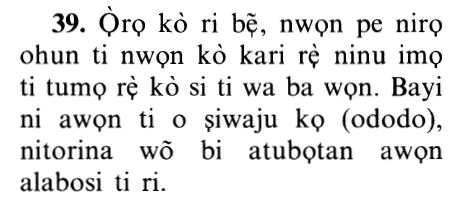10vs39
Select any filter and click on Go! to see results
بَلْ كَذَّبُواْ بِمَا لَمْ يُحِيطُواْ بِعِلْمِهِ وَلَمَّا يَأْتِهِمْ تَأْوِيلُهُ كَذَلِكَ كَذَّبَ الَّذِينَ مِن قَبْلِهِمْ فَانظُرْ كَيْفَ كَانَ عَاقِبَةُ الظَّالِمِينَ
Bal kaththaboo bima lam yuheetoo biAAilmihi walamma yatihim taweeluhu kathalika kaththaba allatheena min qablihim faonthur kayfa kana AAaqibatu alththalimeena
Index Terms
Click to play
Yoruba Translation

Hausa Translation
ôa, sun ƙaryata game da abin da ba su kħwaye da saninsa ba, kuma fassararsa ba ta riga ta jħ musu ba. Kamar waɗancan ne waɗanda suke a gabãninsu. Sai ka dũba, yãya ãƙibar azzãlumai ta kasance?
Asbabu n-Nuzuul (Occasions of Revelation)
أَمْ يَقُولُونَ افْتَرَاهُ قُلْ فَأْتُواْ بِسُورَةٍ مِّثْلِهِ وَادْعُواْ مَنِ اسْتَطَعْتُم مِّن دُونِ اللّهِ إِن كُنتُمْ صَادِقِينَ
Or do they say: "He has forged it'' Say: "Bring then a Surah like unto it, and call upon whomsoever you can besides Allah, if you are truthful!'' (10:38)
He also challenged them in Surah Al-Baqarah, a Madni Surah, to produce one Surah similar to it. He stated in that Surah that they would never be capable of doing so, saying:
فَإِن لَّمْ تَفْعَلُواْ وَلَن تَفْعَلُواْ فَاتَّقُواْ النَّارَ
But if you do it not, and you can never do it, then fear the Fire (Hell). (2:24)
It should be noted here that eloquence was a part of the nature and character of the Arabs. Arabic poetry including Al-Mu`allaqat -- the oldest complete collection of the most eloquent ancient Arabic poems -- was considered to be the best in the literary arts. However Allah sent down to them something whose style none were familiar with, and no one is equal in stature to imitate. So those who believed among them, believed because of what they knew and felt in the Book, including its beauty, elegance, benefit, and fluency. They became the most knowledgeable of the Qur'an and its best in adhering to it.
The same thing happened to the magicians during Fir`awn's time. They were knowledgeable of the arts of sorcery, however, when Musa performed his miracles, they knew that it must have come through someone that was supported and guided by Allah. They knew that no human could perform such acts without the permission of Allah.
Similarly, `Isa was sent at the time of scholarly medicine and during the advancement in the treatment of patients. He healed the blind, lepers and raised the dead to life by Allah's leave. What `Isa was able to do was such that no form of treatment or medicine could reproduce. As a result, those who believed in him knew that he was Allah's servant and His Messenger.
Similarly, in the Sahih, Allah's Messenger said,
مَا مِنْ نَبِيَ مِنَ الْأَنْبِيَاءِ إِلَّا وَقَدْ أُوتِيَ مِنَ الْآيَاتِ مَا آمَنَ عَلَى مِثْلِهِ الْبَشَرُ، وَإِنَّمَا كَانَ الَّذِي أُوتِيتُهُ وَحْيًا أَوْحَاهُ اللهُ إِلَيَّ فَأَرْجُو أَنْ أَكُونَ أَكْثَرَهُمْ تَابِعًا
There was never a Prophet but he was given signs by which the people would recognize him, and that which I was given is revelation that Allah revealed, so I hope that I will have the most followers among them.
Allah then said:
بَلْ كَذَّبُواْ بِمَا لَمْ يُحِيطُواْ بِعِلْمِهِ وَلَمَّا يَأْتِهِمْ تَأْوِيلُهُ ...
Nay, they have belied the knowledge whereof they could not comprehend and what has not yet been fulfilled.
They did not believe in the Qur'an and they have not yet grasped it or comprehended it.
وَلَمَّا يَأْتِهِمْ تَأْوِيلُهُ (And what has not yet been fulfilled),
They have not attained the guidance and the true religion. So they belied it out of ignorance and foolishness.
... كَذَلِكَ كَذَّبَ الَّذِينَ مِن قَبْلِهِمْ ...
Those before them did belie.
meaning, the past nations,
... فَانظُرْ كَيْفَ كَانَ عَاقِبَةُ الظَّالِمِينَ ﴿٣٩﴾
Then see what was the end of the wrongdoers!
Look at how we Destroyed them because they denied Our Messengers in their wickedness, pride, stubbornness and ignorance. So beware you who deny the message that the same end will befall you.
وقوله " بل كذبوا بما لم يحيطوا بعلمه ولم يأتهم تأويله " يقول بل كذب هؤلاء بالقرآن ولم يفهموه ولا عرفوه " ولما يأتهم تأويله " أي ولم يحصلوا ما فيه من الهدى ودين الحق إلى حين تكذيبهم به جهلا وسفها " كذلك كذب الذين من قبلهم " أي من الأمم السالفة " فانظر كيف كان عاقبة الظالمين " أي فانظر كيف أهلكناهم بتكذيبهم رسلنا ظلما وعلوا وكفرا وعنادا وجهلا فاحذروا أيها المكذبون أن يصيبكم ما أصابهم .
"بل كذبوا بما لم يحيطوا بعلمه" أي القرآن ولم يتدبروه "ولما" لم "يأتهم تأويله" عاقبة ما فيه من الوعيد "كذلك" التكذيب "كذب الذين من قبلهم" رسلهم "فانظر كيف كان عاقبة الظالمين" بتكذيب الرسل أي آخر أمرهم من الهلاك فكذلك نهلك هؤلاء
أي كذبوا بالقرآن وهم جاهلون بمعانيه وتفسيره , وعليهم أن يعلموا ذلك بالسؤال ; فهذا يدل على أنه يجب أن ينظر في التأويل .
I'raab - grammatical analysis of the Qur'an
«بَلْ» حرف إضراب وعطف.
«كَذَّبُوا» ماض وفاعله والجملة معطوفة.
«بِما» الباء جارة وما موصولية ومتعلقان بكذبوا.
«لَمْ» جازمة.
«يُحِيطُوا» مضارع مجزوم بحذف النون والواو فاعل والجملة صلة.
«بِعِلْمِهِ» متعلقان بيحيطوا.
«وَ لَمَّا» الواو حالية ولما حرف جازم.
«يَأْتِهِمْ» مضارع مجزوم بحذف حرف العلة والهاء مفعول به.
«تَأْوِيلُهُ» فاعل والهاء مضاف إليه والجملة حالية.
«كَذلِكَ» الكاف جارة واسم الإشارة في محل جر متعلقان بصفة لمفعول مطلق محذوف.
«كَذَّبَ الَّذِينَ» ماض واسم موصول فاعل.
«مِنْ قَبْلِهِمْ» متعلقان بمحذوف صلة الموصول.
«فَانْظُرْ» الفاء عاطفة وأمر وفاعله مستتر.
«كَيْفَ» اسم استفهام في محل نصب خبر مقدم.
«كانَ عاقِبَةُ» كان واسمها.
«الظَّالِمِينَ» مضاف إليه مجرور بالياء لأنه جمع مذكر سالم والجملة مفعول به لانظر.
